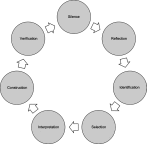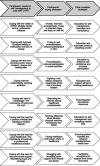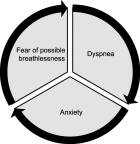COPD patients' experiences, self-reported needs, and needs-driven strategies to cope with self-management
- PMID: 31190788
- PMCID: PMC6529673
- DOI: 10.2147/COPD.S201068
COPD patients' experiences, self-reported needs, and needs-driven strategies to cope with self-management
Abstract
Background: COPD is a common cause of morbidity and mortality. The aim of this study was to explore patients' experiences, self-reported needs, and needs-driven strategies to cope with self-management of COPD. Patients and methods: In this phenomenological study, 10 participants with mild to severe COPD were interviewed 1-2 times, until data saturation was reached. In total, 15 in-depth interviews were conducted, recorded, transcribed, and analyzed. Results: COPD negatively affected participants' physical and psychosocial well-being, their family relationships, and social life. They described their experiences of COPD like fighting a war without weapons in an ever-shrinking world with a loss of freedom at most levels, always fearing possible breathlessness. Fourteen needs were identified and eight clusters of needs-driven strategies that participants used to cope with self-management of COPD. Coping with the reality of COPD, a life-threatening disease, meant coping with dyspnea, feelings of suffocation, indescribable smoking addiction, anxiety, and lack of knowledge about the disease. Reduced participation in family and social life meant loss of ability to perform usual and treasured activities. Having a positive mindset, accepting help and assuming healthy lifestyle was important, as well as receiving continuous professional health care services. The participants' needs-driven strategies comprised conducting financial arrangements, maintaining hope, and fighting their smoking addiction, seeking knowledge about COPD, thinking differently, facing the broken chain of health care, and struggling with accepting support. Procrastination and avoidance were also evident. Finally, the study also found that participants experienced a perpetuating cycle of dyspnea, anxiety, and fear of breathlessness due to COPD which could lead to more severe dyspnea and even panic attacks. Conclusion: COPD negatively affects patients' physical and psychosocial well-being, family relationships and, social life. Identifying patients' self-reported needs and needs-driven strategies can enable clinicians to empower patients by educating them to improve their self-management.
Keywords: COPD; patients’ needs; pulmonary rehabilitation; qualitative research; self-management.
Conflict of interest statement
The authors report no conflicts of interest in this work.
Figures



Similar articles
-
Patient-perceived treatment burden of chronic obstructive pulmonary disease.Int J Chron Obstruct Pulmon Dis. 2017 Jun 1;12:1641-1652. doi: 10.2147/COPD.S130353. eCollection 2017. Int J Chron Obstruct Pulmon Dis. 2017. PMID: 28615937 Free PMC article.
-
Self-rated health aspects among persons living with chronic obstructive pulmonary disease.Int J Chron Obstruct Pulmon Dis. 2017 Apr 12;12:1163-1172. doi: 10.2147/COPD.S129325. eCollection 2017. Int J Chron Obstruct Pulmon Dis. 2017. PMID: 28442902 Free PMC article.
-
Unmet needs of patients with chronic obstructive pulmonary disease (COPD): a qualitative study on patients and doctors.BMC Fam Pract. 2014 Apr 16;15:67. doi: 10.1186/1471-2296-15-67. BMC Fam Pract. 2014. PMID: 24739595 Free PMC article.
-
Activity-related dyspnea in chronic obstructive pulmonary disease: physical and psychological consequences, unmet needs, and future directions.Int J Chron Obstruct Pulmon Dis. 2019 May 24;14:1127-1138. doi: 10.2147/COPD.S188141. eCollection 2019. Int J Chron Obstruct Pulmon Dis. 2019. PMID: 31213793 Free PMC article. Review.
-
The Unmet Needs of People with Chronic Obstructive Pulmonary Disease: A Systematic Review of Qualitative Findings.COPD. 2018 Feb;15(1):79-88. doi: 10.1080/15412555.2017.1417373. Epub 2018 Jan 8. COPD. 2018. PMID: 29308932
Cited by
-
Promoting Self-Management and Independent Living of Older Individuals with Chronic Diseases through Technology: A Study of Self-Reported Needs, Priorities, and Preferences.Medicina (Kaunas). 2023 Aug 19;59(8):1493. doi: 10.3390/medicina59081493. Medicina (Kaunas). 2023. PMID: 37629783 Free PMC article.
-
Development and implementation of the lung volume reduction pulmonary rehabilitation tool to identify eligibility for lung volume reduction in people with chronic obstructive pulmonary disease during pulmonary rehabilitation.Chron Respir Dis. 2023 Jan-Dec;20:14799731231198863. doi: 10.1177/14799731231198863. Chron Respir Dis. 2023. PMID: 37658799 Free PMC article.
-
A systems approach to developing user requirements for increased pulmonary rehabilitation uptake by COPD patients.NPJ Prim Care Respir Med. 2024 Jul 16;34(1):20. doi: 10.1038/s41533-024-00370-1. NPJ Prim Care Respir Med. 2024. PMID: 39013894 Free PMC article.
-
Frustrated Caring: Family Members' Experience of Motivating COPD Patients Towards Self-Management.Int J Chron Obstruct Pulmon Dis. 2020 Nov 17;15:2953-2965. doi: 10.2147/COPD.S273903. eCollection 2020. Int J Chron Obstruct Pulmon Dis. 2020. PMID: 33235444 Free PMC article.
-
Attitudes and practices toward anxiety among haemodialysis patients: a multicentre cross-sectional study in Qingdao, China.BMJ Open. 2025 Jul 11;15(7):e099333. doi: 10.1136/bmjopen-2025-099333. BMJ Open. 2025. PMID: 40645619 Free PMC article.
References
-
- Gudmundsson G. [Acute exacerbations of chronic obstructive pulmonary disease - review]. Laeknabladid. 2015;101(7–8):357–362. - PubMed
-
- Kendall M, Carduff E, Lloyd A, et al. Different experiences and goals in different advanced diseases: comparing serial interviews with patients with cancer, organ failure, or frailty and their family and professional carers. J Pain Symptom Manag. 2015;50(2):216–224. doi:10.1016/j.jpainsymman.2015.02.017 - DOI - PubMed
MeSH terms
LinkOut - more resources
Full Text Sources
Medical

